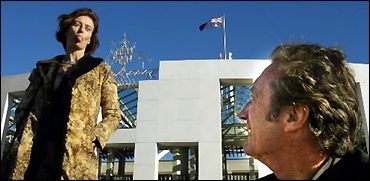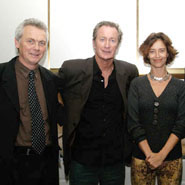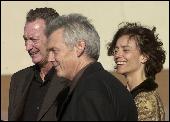 |
 |
Lift pay TV local content, urge actors
|
 |
 |
June 18 2003 |
 |
 |
By Tim Colebatch |
 |
 |
Canberra |
 |
 |
 |
The Australian Film Commission is lobbying the Federal Government to double the amount of Australian content shown on pay TV as part of a wide-ranging review of pay TV rules. Commission chief executive Kim Dalton said yesterday that he had asked the Australian Broadcasting Authority to require pay TV drama channels to lift Australian content from 10 per cent to 20 per cent of program spending. The commission also wants new rules so that 80 per cent of advertising on pay TV is Australian-made, as on free-to-air TV, and documentary channels also show at least 20 per cent Australian content. |
 |
|
 |
Rachel Ward and Bryan Brown want pay TV operators to be required to show more Australian-made dramas, documentaries and advertisements. |
 |
|
 |
Actors Bryan Brown and Rachel Ward lunched at Parliament House yesterday with Arts Minister Rod Kemp and Government MPs, and urged them to block moves by United States trade negotiators to lock Australia into existing film and TV content rules. |
 |
 |
Brown said the US demand would stop Australia applying local content rules to any new forms of entertainment services. If Australia had taken that approach in the 1940s, and then along came television, "we'd have been stuffed", he said. |
 |
 |
"We want the opportunity for Australian stories and Australian ideas within film and television to be able to go forward with the rest of them", he said. Government ministers and MPs were on side, Brown said. |
 |
 |
Mr Dalton said pay TV, with an increasing number of subscribers, had helped finance feature films, but contributed nothing significant to developing television drama. |
 |
 |
Brown said US television was a closed shop. "The last show on American network television that wasn't American was The Avengers, and when do you reckon that was - the '60s?" |
 |
 |
Source: theage.com.au |
 |
|
|
 |
 |
_______________________________________________________ |
 |
 |
_______________________________________________________ |
 |
 |
Stars fear flood of US films
By Malcolm Cole
18 June 2003
|
 |
IT'S not only in Hollywood that the hero turns up at the last minute to save the day. |
 |
Australian actor Bryan Brown and his wife, actor-director Rachel Ward, have come to the rescue of Australia's film industry, which is under siege from the proposed free trade agreement with the US. |
 |
Ward and Brown, who is cast in the hero's role by the Australian Film Corporation, visited Canberra yesterday to talk to politicians and "kick their bums". |
 |
The US, playing the bad guy, is expected to target Australia's film industry subsidies and minimum local content levels on television when free trade talks heat up next month. |
|
|
 |
The film corporation has warned that Australian film and television productions would be swamped by American products if the Federal Government gave away its right to regulate and protect culture. |
 |
Brown said Australia risked losing its culture in return for short-term economic gains. |
 |
"We're not talking about a product that just has a moment and then it's gone," he said of the Australian film industry. |
 |
"This is a cultural thing. This is about who we are, what we are. This goes on and on and on. |
 |
"This isn't just something that you buy and sell and then it doesn't exist any more. |
 |
"We're just trying to preserve our place in this world, which is moving at an ever faster rate." |
 |
The US is believed to have asked Australia to agree to a "standstill" on its TV regulation and film subsidies, which would protect the existing regime but ensure it could not be expanded. |
 |
But film corporation chief executive Kim Dalton said it was impossible to foresee how the delivery of entertainment would change, and that it would be foolish to give up the right to regulate future developments. |
 |
If Australia had made such an agreement for film and radio 50 years ago, it would have forfeited the right to regulate television. |
 |
"It's a little bit of a no-brainer to say that you don't stand here in 2003 and decide to give away the right to introduce regulations on services that you can't even imagine are going to exist in five years' time," Mr Dalton said. |
 |
Brown and Ward said after their meetings that Government MPs were "very on-side". |
 |
"They're all Australian - they want to see it happen," Brown said. "You have just got to sometimes given them a kick in the bum. |
 |
"We're just reminding them that when we get in there, with these very tough American negotiators, that we get the old bloody stranglehold on them and tell them some things just aren't going on." |
|
|
 |
|
 |



